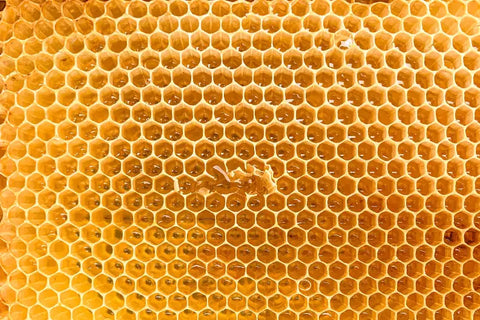Natural honey and type 2 diabetes

Honey has been used in different ways since at least 8000 B.C. Honey was consumed as a sweetener, a gift to the gods, and even as part of the embalming fluid by the ancient Egyptians. Honey was considered a medicine by the ancient Greeks, and it is still considered to provide beneficial health effects today.
If you have diabetes mellitus or are at high risk for developing it, you may be wondering what sweetener to take. Sugar is off the menu (literally), and while there are a variety of sugar replacements, they aren't the same. Also, to be honest, some of the sugar replacements have an aftertaste that you might not enjoy.
You stumble across that bottle of raw honey while looking for a sweetener that won't spike your blood sugar levels. And you're wondering if this golden nectar is a suitable option. Is it, though? The answer to that question is quite complex.
While honey has certain health benefits, it is still a basic sugar and carbohydrate source. For people with diabetes, it is important to keep track of carbohydrate intake throughout the day, especially if they are on insulin. Here's everything you need to know about honey before deciding how to incorporate it into your diet.

What is honey?
Honey is a sweet, syrup-like liquid made by bees from blooming plant nectar. There are many different kinds of honey, depending on the plant source, the extraction technique, and whether it's raw or pasteurized.
Although the nutritional composition of raw honey varies depending on the type, a single tablespoon (21 grams) has 64 calories and 17 grams of carbohydrates, with little to no fat, fiber, or protein. Honey contains a number of micronutrients, vitamins, and minerals, including potassium, iron, and zinc, although only in trace levels, accounting for less than 1% of the RDA.
Consumption of honey differs from white or "table" sugar in that it contains no vitamins or minerals. Honey in comparison with sugar has a lower glycemic index. The glycemic index is a measurement of how rapidly a food elevates blood glucose. Honey has a value of 58, whereas sugar has a glycemic index of 60. Honey, like other carbohydrate types, significantly elevates blood sugar levels, although not as quickly as sugar. Besides that, we will explore the difference and its significance in this article.

Typical honey types are:
Honey from clover;
Honey from avocado;
Honey made from buckwheat;
Honey made from blueberries;
Honey made with sage;
Honey made from Eucalyptus;
Honey made from orange blossoms;
Honey made from the alfalfa plant.

So can people with diabetes eat honey?
Honey is a natural substitute for sugar and it is likely good if you have well-controlled diabetes, are not overweight, and are overall healthy. Honey is, after all, sugar, which contributes to elevated blood sugar levels. Honey is a natural sugar and it is rich in carbohydrates. Therefore it's only natural that it has an effect on your blood sugar levels. Honey, however, appears to have a lower effect when compared to ordinary sugar.
Honey and table sugar were compared in a 2004 study to see how they affected blood sugar levels. Individuals with and without type 1 diabetes took part in this research.
Honey induced an initial spike in blood glucose 30 minutes after eating in a group of people with diabetes, according to the researchers. Participants' blood sugar levels, on the other hand, dropped and stayed at lower levels for two hours.
There are things that should be part of your diet if you are overweight and have poorly controlled diabetes and blood sugar, but honey is not one of them.
Even while there is encouraging research on honey's ability to help with diabetes control, the results are mixed. Reducing additional sugar in your diet, eating low-sugar fruits, and going low on carbohydrates is really in your best interest.

The benefits of honey for people with type 2 diabetes
Given that diabetes is a complex metabolic illness, any meals that promote metabolic health are likely to have an impact on diabetes diet and management. This would explain why natural honey, in addition to anti-diabetic drugs, might be useful and have health benefits.
Honey may or may not be a smart choice for diabetics, according to experts. According to studies, honey has anti-inflammatory and antioxidant qualities. This might be especially crucial for diabetics, who have greater amounts of inflammation in their systems. Many meals, on the other hand, include antioxidants without boosting blood sugar levels. So it isn't required for you to eat honey to obtain those nutrients.
There are other solutions available to you that would be better for you. Keeping track of how much carbohydrates and fiber you consume might also help you avoid dangerously high blood sugar levels. Even if you take insulin, having a high blood sugar level might cause health concerns in the long run. That's why it's a good idea to keep honey to a minimum. To find out how much is safe for you, talk to your diabetes educator, doctor, or nutritionist who specializes in diabetes. But let's explore what could be the potential benefits of minimal honey consumption.
Antioxidant properties
Honey of good quality includes phenolic acids and flavonoids, which are important antioxidants that may help with general health. Antioxidants are natural compounds that have been shown to reduce the risk of heart disease, stroke, and some forms of cancer. Antioxidants may aid in the prevention of a variety of metabolic illnesses.
Antioxidants are compounds that help fight disease-causing free radicals and reduce the risk of oxidative cell damage. These molecules are important in both health and disease, and some research suggests that they may protect against chronic illnesses including heart disease, cancer, and diabetes.
Antioxidants are found in dark honey. Two different studies found that dark buckwheat honey is a good source of antioxidants. Given that the typical human sweetener consumption is about 70 kg per year, substituting honey for standard sweeteners in some diets might result in an increased antioxidant defense system in healthy individuals.
Honey can affect your heart health
Honey could also prevent the occurrence of cardiovascular disease. Honey could help decrease blood pressure, enhance blood fat levels, regulate your heartbeat, and prevent the death of healthy cells, according to one study. All variables can help you enhance your heart health and function.
Research including over 4,500 participants over the age of 40 found that moderate honey consumption was linked to a decreased risk of high blood pressure in women. Honey also helped protect the heart from oxidative stress in rats, according to promising research.
Propolis, a form of resin produced by bees from sap-producing trees and related plants, is also commonly found in raw honey. Propolis has been shown to help lower cholesterol and triglyceride levels. Honey intake decreases high total cholesterol and LDL, improves HDL, and lowers inflammatory markers of illness in humans, according to several studies.
Generally, there was no long-term human research on the correlation between heart health and honey. But results from ongoing studies show great potential.
Cough suppressant
Soothing a sore throat with tea or warm lemon water combined with honey is an age-old remedy. Eating honey, on the other hand, could be an effective cough suppressant on its own.
In one trial, children between the age of 1 to 5 were given up to 10 milliliters of honey before bedtime if they had an upper respiratory tract infection. That is about 2 teaspoons. Honey appeared to help with nighttime coughing and sleep.
In fact, honey looked to be as efficient as dextromethorphan, a popular cough suppressant component, in regular over-the-counter amounts in the study. However, before attempting this, consult your healthcare physician. Honey (both ordinary and raw) can contain microscopic amounts of germs that cause botulism, therefore never give it to children under the age of one.
Honey can be used to treat chronic and acute wounds
While honey does not appear to have any metabolic benefits, it does appear to have therapeutic effects when applied to the skin. Honey contains hydrogen peroxide, which may help explain why it has antibacterial effects. Honey also has a high sugar content, which slows bacterial development, as well as a low pH, which kills germs. Honey is occasionally prescribed for wounds or infections on the skin. It has been demonstrated to destroy germs and improve the healing of wounds.
Raw manuka honey is thought to be a superior option for treating infections. However, before attempting this, consult your healthcare physician. Honey can contain microscopic amounts of germs that cause botulism, therefore never give it to children under the age of one.

Honey and type 2 diabetes risks
Always remember that honey is sweeter than regular table sugar. You simply need a small amount of honey to replace sugar. That way your blood sugar will stay balanced. Honey should only be ingested in little amounts. Before using it as a sweetener, ask your healthcare professional.
Honey and other sweeteners should be avoided until your diabetes is under control because they might impact your blood sugar.
If you have well-controlled diabetes and wish to incorporate honey into your healthy diet, go for pure, organic, or raw natural honey. Because all-natural honey contains no added sugar, these varieties are safer for diabetics. Raw honey, on the other hand, should not be consumed by pregnant women or people with impaired immune systems since it is not pasteurized.
Sugar or syrup may be present in processed honey purchased from a grocery shop. The extra sweetener and carbohydrates can have a distinct effect on your blood sugar levels.
To find out how much honey is safe for you, talk to your diabetes educator, doctor, or nutritionist who specializes in diabetes.



